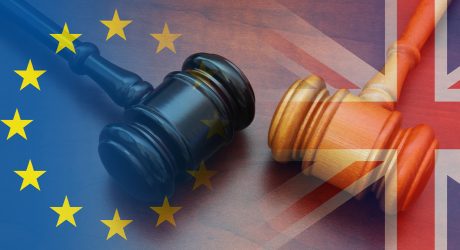A tragic and unusual case involving pub signs, a telehandler and the illegality defence demonstrates the continued importance of retained EU law to victims of road traffic accidents. It illustrates how serious injury victims can, at least for now, rely on principles from EU case law that continue to apply following Brexit. However, as the Retained EU Law Revocation and Reform Bill makes its way through parliament, there is uncertainty as to whether victims will continue to benefit from these protections in the future.
In this article, first published in the March edition of PI Focus and revised following the announcement of planned revisions to the government’s bill, Christopher Deacon and James Griffin use the case study of JL to consider how the continued application of EU law in this way following Brexit is relevant to serious injury victims.
Background
In January 2019, JL, a young graduate from rural Somerset, was finishing a morning shift at a local pub in Kingsbury Episcopi. He was joined by acquaintances who were drinking at the pub. A fourth individual, the first defendant in the case and a local farmer, later joined the group. He arrived on the scene in a Caterpillar telehandler, having been asked by the pub landlord to assist with accessing and changing the pub’s sign.
Once the first defendant had changed the sign at the first village pub, he headed to a second pub in the village to complete the same task. JL and the rest of the group also travelled to the second pub by car.
After successfully changing the second pub sign, the group decided to return to the first pub for further drinks. Before setting off, JL and one of his friends climbed into the bucket of the telehandler. The first defendant tried unsuccessfully to tip JL and his friend out of the bucket. He then decided to set off down the road with JL and his friend travelling as passengers in the bucket.
Unbeknownst to JL at the time, the telehandler was uninsured and was being driven by the first defendant without a master brake control unit. The first defendant had recently removed the brake control unit himself. During the short journey back to the first pub, the telehandler went over a bump in the road, causing JL to be thrown from its bucket. He struck the rim of the telehandler bucket before falling to the ground. After JL landed on the road, the telehandler continued forward, with the rear offside wheel driving over JL and causing him to suffer life-changing injuries. These included a spinal cord injury resulting in T4 incomplete paraplegia and severe heterotopic ossification around the right hip.
The first defendant was prosecuted for his involvement in the incident and served a 10-month custodial sentence. JL’s civil claim was brought against the first defendant driver, with the Motor Insurers’ Bureau (MIB) named as the second defendant under the terms of the Uninsured Drivers Agreement.
Defence
Following commencement of High Court proceedings in 2021, the MIB pleaded a defence of illegality. This is often referred to using the Latin maxim ‘ex turpi causa non oritur actio’, meaning ‘no action can arise from an illegal act’.
The MIB denied both that the first defendant drove negligently and that the absence of a foot brake on the vehicle was causatively relevant to JL’s injuries. The MIB submitted that, in any event, the incident as a whole was a joint criminal enterprise and that JL had instigated being carried illegally in the bucket of the telehandler. The MIB suggested that JL encouraged and assisted, and intended to encourage and assist, the driver in his criminal activity of driving the telehandler dangerously. Although JL was unaware of the lack of insurance and working foot brakes on the vehicle, the MIB submitted that knowledge of these facts would not have prevented JL from climbing into the bucket. It was submitted that the act of carrying a passenger in the bucket of a telehandler was dangerous driving, and both JL and the driver were jointly engaged in this act at the time.
Two questions arose in relation to the MIB’s defence:
- Could the illegality defence apply in the circumstances of JL’s case?
- If so, was an illegality defence when relied upon by the MIB as an emanation of the state permissible in view of the operation of retained EU law?
Illegality and joint enterprise
The starting point when assessing the principle of illegality under English law generally remains the Supreme Court decision of Patel v Mirza [2016] UKSC 42. In Patel, it was suggested that a rules-based test for applying the illegality defence was not possible as it may lead to some claimants being denied justice. Instead, when assessing whether a claimant should be refused their claim for damages because of their illegal conduct, the judgment of Lord Toulson proposed a court should:
“a) Consider the underlying purpose of the prohibition which has been transgressed and whether that purpose will be enhanced by denial of the claim;
- b) Consider any other relevant public policies which may be rendered ineffective or less effective by denial of the claim; and
- c) Consider whether denial of the claim would be a proportionate response to the illegality, bearing in mind that punishment is a matter for the criminal courts.”
The case of R v Jogee [2016] UKSC 8 remains the starting point for considering what constitutes a joint criminal enterprise. In that case, it was decided that an individual must be shown to have encouraged the assistance of an offence by the principal for there to be a joint enterprise. In addition, it must be shown that the individual intended to assist or encourage the commission of the crime. This requires knowledge that a criminal act is taking place.
While the above cases provide the over-arching legal framework and principles developed by the courts in relation to the defence of illegality and whether there is a joint criminal enterprise, how those principles apply in a given case is fact specific. It is, however, possible to deduce the following general guidance from the authorities:
- For an illegality defence to succeed, the defendant must demonstrate that the claimant has committed an illegal act that is causally linked to any loss claimed.
- Specifically, in joint enterprise cases, the defendant must show that the claimant encouraged or assisted in the commission of the crime and that the claimant intended to encourage or assist in the commission of a crime. This requires knowledge of any existing facts necessary for the claimant’s conduct to be considered criminal in nature.
- If the claimant is deemed an accessory to a joint criminal enterprise and suffers injury due to the principal’s criminal conduct, the claimant cannot sue the principal to recover compensation for their injuries. As an accessory, such a claimant stands in the shoes of the principal and cannot be allowed to claim damages in circumstances where he himself is deemed jointly responsible for the criminal act which led to his injuries.
JL’s claim was compromised on favourable terms before trial. It is, however, strongly arguable that on the facts of JL’s case, a finding of illegality based on a joint criminal enterprise would have been unlikely. The criminal prosecution had established that the first defendant was aware the vehicle did not have functioning brakes, having removed them himself. The removal of the brake unit and decision to then drive the vehicle in an unsafe condition was a key part of the Crown Prosecution Service’s decision to charge the first defendant with dangerous driving.
When climbing into the bucket, JL was unaware that the vehicle had no working brakes fitted. JL’s evidence was that he would never have climbed into the bucket of the telehandler if he had been made aware of this fact. It arguably follows that it would be difficult for the MIB to establish that JL was part of a joint enterprise when JL was completely unaware of the dangerous condition of the vehicle that formed the basis of the criminal prosecution against the first defendant.
Compatibility with retained EU law
Even if the MIB had been able to establish the illegality defence applied as a matter of English law on the facts of JL’s case, the question then arose as to whether, pursuant to retained EU law principles and as an emanation of the state, the MIB would be permitted to rely upon a complete defence of illegality to defeat JL’s claim.
Before Brexit, the Court of Justice of the European Union (CJEU) had repeatedly ruled that the compulsory insurance provisions of the EU Motor Insurance Directive (MID) regime could not be avoided to bar a victim’s claim arising from a road traffic accident where it would be disproportionate to deny the victim their entitlement to damages.
Examples of the CJEU finding national law provisions contravened the protections of victims under the MID include the Spanish case of Bernaldez (Case C-129/84 [1986]), which involved injuries suffered by a third party following a road traffic collision caused by an intoxicated driver. In Spain, the insurer for the driver was initially absolved as Spanish law permitted insurers to exclude cover where a driver was intoxicated. This was overturned by the CJEU, which took the view that Spanish law was incompatible with the purpose of the MID.
Another example is the Portuguese case of Delgado Mendes (Case C-503/16 [2017]). This involved a claimant who was the owner and vehicle policyholder of a stolen car. During the thief’s getaway, the claimant, a pedestrian at the time, was struck and injured by his own vehicle being driven by the thief. Portuguese legislation attempted to limit the claimant’s ability to claim damages against his own insurance. The CJEU held that the compulsory insurance provisions of the MID could not be sidestepped in this way.
The CJEU had, therefore, recognised the limitations on the illegality defence under the MID prior to Brexit, meaning that principles from the CJEU’s case law form part of the body of retained EU law.
Before the UK’s withdrawal from the EU, the UK government had failed to implement the MID properly. Recent decisions in MIB v Lewis [2019] 1 WLR 6298 and Colley v MIB [2022] EWCA Civ 360 have established that the MIB is an emanation of the state for the purposes of direct effect of an EU directive.
Where a government has failed to implement an EU directive properly, an individual can invoke the doctrine of direct effect and rely on the directive in its original form and the interpretations applied by the CJEU to the wording of the original directive. In the case of the MID and the UK government’s failure to properly implement its provisions, the victim of an uninsured driver can bring a claim against the MIB and (post-Brexit) rely on principles of retained EU law when doing so.
In the case of JL, he could therefore rely on a combination of the direct effect of the MID against the MIB and the principles of retained EU law to argue that the MIB could not rely on the illegality defence as this would have the effect of denying him the right to compensation in its entirety.
The more appropriate and proportionate approach to reflect JL’s conduct would be to reduce his damages by a given percentage based on contributory negligence principles. A deduction for contributory negligence is permissible as a matter of retained EU law and is approached flexibly as a matter of English law, weighing up the respective blameworthiness and causative potency of the driver and passenger’s actions.
Concluding thoughts
While some may question the continued application of EU law in this way following Brexit, these protections are vital to serious injury victims who should be able to rely on a comprehensive compulsory motor insurance regime, as was always intended by the MID despite the UK government’s failure to properly implement its provisions.
The government confirmed in May 2023 that the Retained EU Law Revocation and Reform Bill would be amended “to be clear which laws we intend to revoke at the end of this year”, rather than automatically revoking EU laws in their entirety. That said, given details have not yet been released as to which laws will be scrapped and which will be retained, the wide-ranging protections afforded to serious injury victims under the retained EU law provisions of the MID may still be under threat. The UK’s motor insurance law landscape will likely evolve down a track of its own in the future, which might enable motor insurers and the MIB greater scope to defend claims based on the defence of illegality.
Christopher Deacon and James Griffin of Stewarts represented JL. They instructed Paul Russell KC, Philip Mead and Max Archer of 12 King’s Bench Walk. The MIB was represented by Weightmans. The first defendant did not actively participate in the proceedings.
You can find further information regarding our expertise, experience and team on our International Injury and Personal Injury pages.
If you require assistance from our team, please contact us.
Subscribe – In order to receive our news straight to your inbox, subscribe here. Our newsletters are sent no more than once a month.







